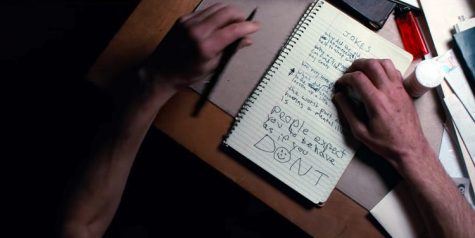“Joker” Leaves a Lasting Emotional Impact on Audiences
“Smile and put on a happy face.” ~ “Joker”

Joaquin Phoenix as Joker, looks at his reflection through a mirror with part of the famous “Smile and put on a happy face” line written on it in red.
May 15, 2020
Todd Philip’s 2019 film, “Joker,” has taken the world by storm. His unique take on this classic villain’s story shines light upon the darkness within the mind of Arthur Fleck, showcasing the importance of mental health and those living with it. “Joker” touched people all over the world, leaving a lasting impression upon the students of EBHS.

After watching “Joker,” teens at EBHS discover the truths about those suffering with mental illnesses. With Arthur Fleck, the film highlights the weight of a smile, and how a simple happy face can hide so much pain within a person. Fleck is constantly depicted with a smile upon his face when he is out in the world, whereas in the shadows, the audience enters his pain filled mind. One memorable scene in the film that impacted viewers is when he wrote in his journal that “The worst part about having a mental illness is that people expect you to behave as if you don’t.” Arthur shows that he tries impeccably hard to hide his true self with his smile and furthermore with his stand up comedy because people simply don’t understand his pain. Nicky Lopez, a senior at EBHS, was wowed by this and so much more within “Joker”. When leaving the theater, it was very clear that when Arthur said “I used to think my life was nothing but a tragedy, but now, now I realize it’s all just a comedy.” it held a lot of significance to him. Nicky explained how “That Joker in that movie has been lied to and beaten up and ignored his entire life. Because of all of that it led him to a life when the suffering of others is funny.” This really opened Nicky’s eyes because it showed Arthur that his pain is amusing to others, leading Arthur to find amusement in other people’s pain. Nicky continued saying how “I guess I can connect this by saying that when someone does something bad to you, sometimes people will think that their suffering is funny. At least that’s kind of what Joker thought in the movie… he thought that killing people is funny.” Though Joker’s perspective may be frightening and disturbing, the film seeks to promote empathy by suggesting that thoughtless cruelty and resulting desensitization are dangerous and contagious.


